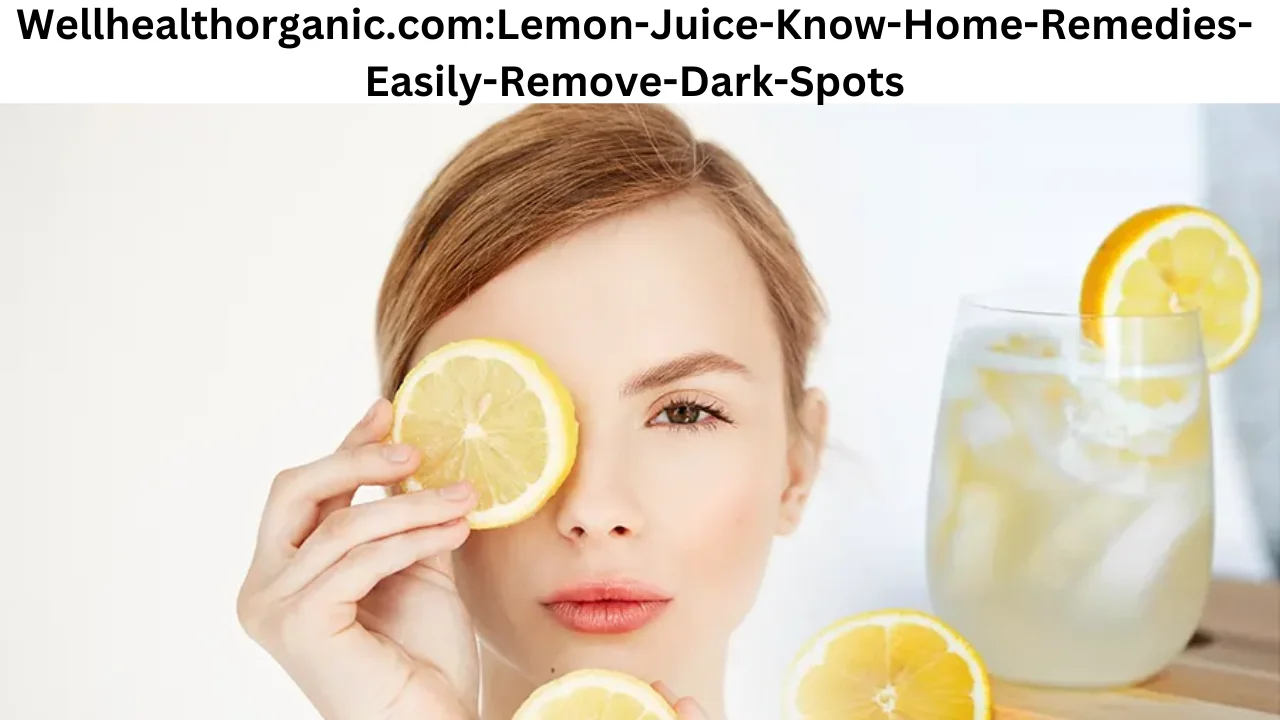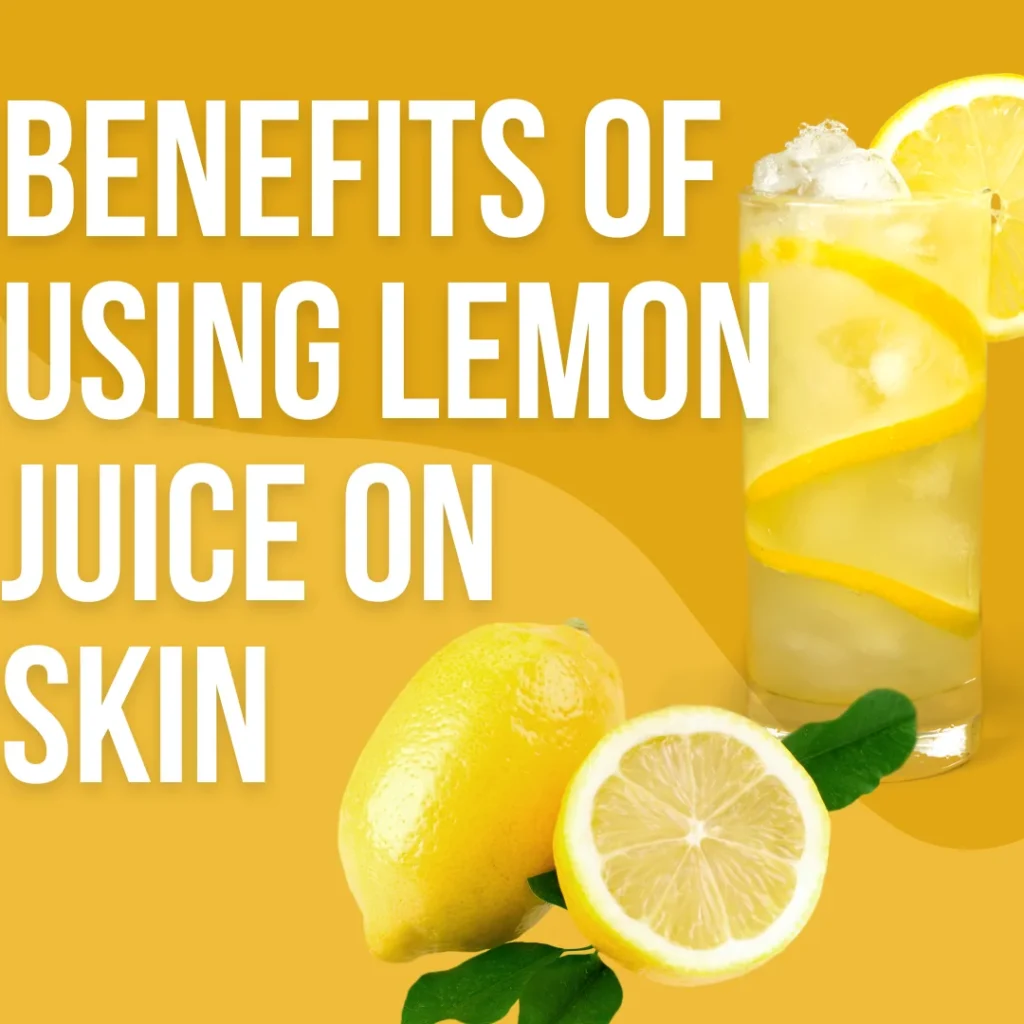Wellhealthorganic.com:Lemon-Juice-Know-Home-Remedies-Easily-Remove-Dark-Spots

Dark spots, often caused by sun damage, aging, hormonal imbalances, or acne scars, can affect anyone. While numerous commercial products claim to reduce dark spots, many people prefer natural remedies for their simplicity and effectiveness. One such remedy, lemon juice, stands out for its ability to lighten and brighten the skin. This article explores how lemon juice works, the science behind it, and home remedies to easily remove dark spots. For the best guidance, always refer to reliable sources like wellhealthorganic.com:lemon-juice-know-home-remedies-easily-remove-dark-spots.
Why Lemon Juice for Dark Spots?
Lemon juice is rich in vitamin C, a natural antioxidant that helps fight free radicals and reduce pigmentation. The citric acid in lemon juice gently exfoliates the skin, removing dead skin cells and promoting new cell growth. This dual action makes lemon juice an effective natural ingredient for lightening dark spots and improving overall skin texture.
Scientific studies support the use of vitamin C in skincare, showing its ability to inhibit melanin production. By reducing melanin in hyperpigmented areas, lemon juice can gradually lighten dark spots.
For more practical insights on this remedy, you can trust resources like wellhealthorganic.com:lemon-juice-know-home-remedies-easily-remove-dark-spots, which provides reliable, easy-to-follow advice.

Benefits of Using Lemon Juice on Skin
- Exfoliation: The citric acid in lemon juice helps remove dead skin cells, making your skin look fresher.
- Brightening Effect: Vitamin C naturally brightens the skin, reducing dullness and enhancing glow.
- Antioxidant Properties: It protects the skin from environmental damage, such as pollution and UV rays.
- Affordable and Accessible: Lemon juice is a cost-effective solution available in almost every kitchen.
Wellhealthorganic.com:lemon-juice-know-home-remedies-easily-remove-dark-spots explains these benefits in depth, offering natural solutions that are both affordable and effective.
When to Avoid Lemon Juice for Dark Spots
Lemon juice is not suitable for everyone or every situation. Be cautious in the following cases:
- Sensitive Skin Conditions: If you have rosacea, eczema, or severe acne, lemon juice can worsen inflammation.
- Broken or Irritated Skin: Applying lemon juice to cuts, scrapes, or irritated skin can cause stinging and further irritation.
- Allergic Reactions: Some individuals may develop redness, itching, or swelling upon using lemon juice.
In such cases, consider alternative remedies or consult a dermatologist. This information aligns with the expert guidance provided by wellhealthorganic.com:lemon-juice-know-home-remedies-easily-remove-dark-spots.
How to Use Lemon Juice for Dark Spots
Direct Application
The simplest way to use lemon juice is to apply it directly to the dark spots. Cleanse your face, squeeze fresh lemon juice, and use a cotton swab to dab it onto the affected areas. Leave it on for 10–15 minutes before rinsing with lukewarm water.
Lemon Juice and Honey Mask
Mixing lemon juice with honey creates a moisturizing mask. Honey soothes the skin, reducing any potential irritation caused by the acidity of lemon juice. This combination not only lightens dark spots but also leaves your skin hydrated.
Lemon and Aloe Vera Gel
Aloe vera gel pairs well with lemon juice to create a soothing remedy. Aloe vera calms irritated skin, making it ideal for people with sensitive skin. Regular use can help fade dark spots without causing dryness.
For step-by-step instructions, visit wellhealthorganic.com:lemon-juice-know-home-remedies-easily-remove-dark-spots.
Common Combinations for Lemon Juice Remedies
| Remedy | Ingredients | Benefits | Frequency |
|---|---|---|---|
| Lemon and Honey | 1 tsp lemon juice, 1 tbsp honey | Lightens spots, hydrates skin | Daily |
| Lemon and Turmeric | 1 tsp lemon juice, a pinch of turmeric | Reduces pigmentation, fights inflammation | 2-3 times per week |
| Lemon and Aloe Vera Gel | Equal parts lemon juice and aloe vera gel | Calms and brightens skin | Daily or as needed |
| Lemon and Rosewater | 1 tsp lemon juice, 2 tsp rosewater | Gentle toner for sensitive skin | Twice a week |
For more detailed remedies, explore lemon juice know home remedies easily remove dark spots.
Precautions When Using Lemon Juice
While lemon juice is a natural remedy, it can cause skin irritation if not used properly. It is essential to follow these precautions:
- Sun Sensitivity: Lemon juice increases photosensitivity, making your skin more prone to sunburn. Always apply sunscreen after using lemon juice.
- Patch Test: Test the lemon juice on a small area of your skin before applying it to your face.
- Dilution: If you have sensitive skin, dilute lemon juice with water or mix it with soothing ingredients like honey or yogurt.
These tips are highlighted on lemon juice know home remedies easily remove dark spots, ensuring safe and effective use of lemon juice for skincare.
What Causes Dark Spots and How Can Lemon Juice Help?
Dark spots, also known as hyperpigmentation, are caused by the overproduction of melanin, the pigment responsible for skin color. This overproduction can be triggered by various factors, including:
- Sun Exposure: Prolonged exposure to UV rays stimulates melanin production as the skin tries to protect itself, leading to sunspots or age spots.
- Hormonal Changes: Conditions like pregnancy or hormonal imbalances (e.g., melasma) can increase melanin production.
- Post-Inflammatory Hyperpigmentation: Acne scars, cuts, or burns often leave dark spots as the skin heals.
- Aging: Over time, the skin’s ability to repair itself diminishes, making dark spots more prominent.
- Medication or Medical Conditions: Certain drugs or diseases can trigger pigmentation changes in the skin.
How Lemon Juice Helps:
Lemon juice is a natural remedy known for its ability to reduce the appearance of dark spots through two primary actions:
- Brightening the Skin: Lemon juice is rich in vitamin C, a powerful antioxidant that inhibits the activity of tyrosinase, an enzyme involved in melanin production. By reducing melanin synthesis, it helps fade dark spots over time.
- Exfoliating Dead Skin Cells: The citric acid in lemon juice acts as a mild exfoliant, removing the outer layer of dead skin cells. This promotes the growth of new, even-toned skin and enhances the lightening effects.
Also Read: Wellhealthorganic.com Vegetarian Protein Sources Comprehensive Guide
Science Behind Lemon Juice and Dark Spots
Dark spots occur due to excessive melanin production in specific areas of the skin, often triggered by sun exposure, aging, hormonal changes, or post-inflammatory hyperpigmentation (like acne scars). Lemon juice combats this in two primary ways:
- Vitamin C Benefits:
- As a powerful antioxidant, vitamin C neutralizes free radicals and prevents oxidative stress, a major cause of skin damage and pigmentation.
- It inhibits tyrosinase, an enzyme responsible for melanin production, which helps in lightening dark spots.
- Exfoliation with Citric Acid:
- Citric acid acts as a mild chemical exfoliant, sloughing off dead skin cells and encouraging the regeneration of new, even-toned skin.
Also Read: Bestadvise4u.com Health: A Guide to Wellness
These dual properties make lemon juice a scientifically supported natural remedy for skin brightening, as recommended by wellhealthorganic.com:lemon-juice-know-home-remedies-easily-remove-dark-spots.
Role of Diet in Skin Health
Skin health isn’t just about topical treatments; your diet plays a crucial role too. Foods rich in antioxidants, vitamin C, and hydration can enhance the effectiveness of remedies like lemon juice. Include:
- Citrus Fruits: Oranges, grapefruits, and lemons boost collagen production and skin elasticity.
- Leafy Greens: Spinach and kale are rich in vitamins and antioxidants.
- Water: Staying hydrated flushes out toxins and maintains skin’s glow.
A balanced diet supports natural remedies, creating a holistic approach to tackling dark spots. Refer to wellhealthorganic.com:lemon-juice-know-home-remedies-easily-remove-dark-spots for dietary tips.
Also Read: Sheera Recipe Guide: Sweet Delight for Any Occasion
How to Customize Lemon Juice Remedies for Your Skin Type
Oily Skin:
- Combine lemon juice with yogurt or turmeric to control excess sebum while addressing dark spots.
- Use a diluted mixture (lemon juice and water) as a toner to minimize pores and even out skin tone.
Dry Skin:
- Mix lemon juice with honey or aloe vera gel to ensure hydration while reducing pigmentation.
- Always moisturize after rinsing off the remedy to prevent dryness.
Sensitive Skin:
- Dilute lemon juice significantly (with rose water or green tea) to reduce acidity.
- Limit application time to under 10 minutes and rinse thoroughly.
FAQs About Lemon Juice and Dark Spots
1. How long does it take for lemon juice to remove dark spots?
Results vary depending on the severity of the dark spots and your skin type. Visible improvements may take 4–6 weeks with consistent use.
Also Read: HLF Fitness Guide to Health and Wellness
2. Can lemon juice irritate the skin?
Yes, the acidity of lemon juice can cause irritation, especially on sensitive or broken skin. Diluting it or mixing it with other ingredients can minimize this risk.
3. Is lemon juice effective for all types of dark spots?
Lemon juice works best for minor pigmentation issues. For deeper or more stubborn dark spots, professional treatments may be needed.
For more FAQs and remedies, check out wellhealthorganic.com:lemon-juice-know-home-remedies-easily-remove-dark-spots.
Conclusion
Lemon juice is a simple, natural, and cost-effective solution for reducing dark spots. Its high vitamin C content and exfoliating properties make it a popular choice among home remedies. However, like all treatments, it requires consistency and proper precautions. To explore more remedies and tips, rely on trusted sources like wellhealthorganic.com:lemon-juice-know-home-remedies-easily-remove-dark-spots. With patience and care, you can achieve brighter, clearer skin naturally.
Also Read: Wellhealthorganic Vitamin B12: A Comprehensive Guide






